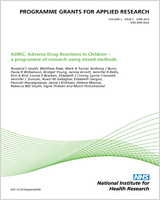Included under terms of UK Non-commercial Government License.
NCBI Bookshelf. A service of the National Library of Medicine, National Institutes of Health.
Iliffe S, Wilcock J, Drennan V, et al. Changing practice in dementia care in the community: developing and testing evidence-based interventions, from timely diagnosis to end of life (EVIDEM). Southampton (UK): NIHR Journals Library; 2015 Apr. (Programme Grants for Applied Research, No. 3.3.)

Changing practice in dementia care in the community: developing and testing evidence-based interventions, from timely diagnosis to end of life (EVIDEM).
Show detailsFamiliarisation
This early stage is for the researchers to get familiarised with the data and sensitised to early themes. It encourages the research to see the individual differences inherent in transcripts that can sometimes get lost when coding begins. The process of sensitisation to these individual differences also enables the researcher to better identify within- and between-participant differences. In a few cases, the researcher felt the need to revert to the original recorded interview to get a better feel for the data. Any emergent early impressions were noted, relating to reactions to transcript/participant, how they felt as they listened to the participant, and any specifics that they wanted to remember for later. These were jotted on one side of the paper transcript.
Identifying a thematic framework
This stage of framework analysis is commonly referred to as ‘coding’ in other qualitative methodologies. This principally involves identifying key themes, issues or discussion points embedded in the transcript. These are delineated and assigned a ‘code’ or a name that best captures the essence of the theme or issue identified. In framework analysis, ‘a priori issues’ questions can form the basis of the themes – we therefore used the interview topic guide as a starting point for creating overarching categories and any emergent themes from transcripts were coded as responses to each question. As Pope and colleagues describe,262 the outcome of this stage is a ‘detailed index’ of the data into ‘manageable chunks for subsequent retrieval and exploration’, which is what we achieved.
Example
- We were keen to ascertain the training on the MCA practitioners had been offered. We therefore labelled ‘Training’ as one of our a priori categories and coded (1) ‘no training’, (2) ‘1-day training course’, (3) ‘1+ day training programme’, and (4) ‘MCA training as part of other activities’. We were able to identify and make inferences regarding the amount of training one participant group had had compared with another.
Indexing
Indexing refers to the process of numerically annotating transcripts in order to identify consistencies, which then go on to develop the coding framework. However, we followed this process slightly differently. All of the word codes (as opposed to numerical) that had been generated during stage 2 were listed on a separate sheet of paper. We then grouped together all codes that shared commonalities or consistencies. These clusters were given an appropriate name.
Example
- One of our interview questions referred to ‘Practice experiences’ – we named this as an overarching category, incorporating (1) ‘intrinsic impact’, (2) ‘community role of X’, (3) ‘role of safeguarding’, and (4) ’change and extension to job role’ as separate codes under it.269
Charting
Framework analysis describes this stage as a process of rearranging the data and thematic framework to create order, not dissimilar to the iterative principle of grounded theory.449 We applied this stage as a principle for synthesising and developing our final coding framework through a process of abstraction, in order to derive all the detail from the data and ensure that we were coding elements that may have been missed with simply an a priori approach.
Example
- The question asking all participants about their personal experiences of caregiving (family caring) was asked as a final question to round off the interview. Family caring experiences were commonly reported and participants offered examples of how these had contributed to their professional understanding of dementia and caring. In relation to this, five main codes were developed: (1) ‘informing the professional role’, (2) ‘insight into services’, (3) ‘professional influences on caring’, (4) ‘planning’, and (5) ‘no apparent effect of MCA’.
Mapping and interpretation
Mapping and interpreting essentially are ways of representing pictorially or graphically all of the themes and investigating how each of the themes relates to each other. This detailed exploration of the iteratively developed and revised thematic framework enabled us to gain a clearer understanding and explanation of the ‘bigger picture’. For instance, we examined the association between three categories: (1) ‘training’, (2) ‘(self-reported) knowledge of the MCA’, and (3) ‘self-reported confidence’; and we were able to identify and offer explanations for individual discrepancies between these three categories.
Example
- In Manthorpe et al.268 we describe how some participants, with no training and limited self-reported knowledge, reported high levels of confidence in abiding by the Act. We questioned the reliability of some self-reported knowledge about the MCA, and have considered the adequacy of training now the Act is no longer ‘new’ and the potential for mandatory training for all staff.
- Chapter 5: Five main stages in framework analysis - Changing practice in dementi...Chapter 5: Five main stages in framework analysis - Changing practice in dementia care in the community: developing and testing evidence-based interventions, from timely diagnosis to end of life (EVIDEM)
- SRD5A2 [Tauraco erythrolophus]SRD5A2 [Tauraco erythrolophus]Gene ID:104375569Gene
- CERS6 [Ailuropoda melanoleuca]CERS6 [Ailuropoda melanoleuca]Gene ID:100473865Gene
- Atf6b activating transcription factor 6 beta [Mus musculus]Atf6b activating transcription factor 6 beta [Mus musculus]Gene ID:12915Gene
Your browsing activity is empty.
Activity recording is turned off.
See more...